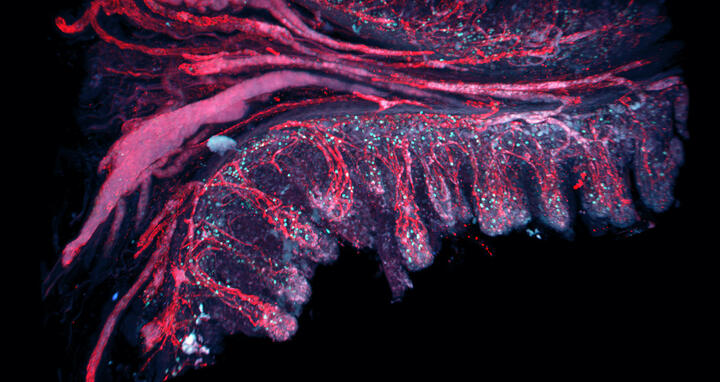How diseases begin in the gut
The human gut is teeming with life: it is home to more than 1,000 species of bacteria that help with digestion, produce signaling molecules for other organs, and assist the immune system. When this complex collection of microbes, collectively known as the gut microbiome, gets out of balance, it can result in chronic inflammatory bowel diseases and can likely lead to metabolic disorders, inflammatory diseases of the nervous system, and vascular diseases as well. As Hippocrates said, some 2,500 years ago, “All diseases begin in the gut.”
The interaction between intestinal mucosa inflammation and blood vessel function is now being investigated by a Berlin-based team of basic, clinical and computer scientists in the InFlame Study. Participating institutions include the Experimental and Clinical Research Center (ECRC), the Department of Gastroenterology, Infectiology and Rheumatology at Charité – Universitätsmedizin Berlin (Campus Benjamin Franklin), the Max Delbrück Center and the Berlin Institute of Health (BIH). The ECRC is a joint institution of the Max Delbrück Center and Charité. The researchers are focusing on diseases such as Crohn’s disease, ulcerative colitis, multiple sclerosis, hypertension and diabetes.
3D atlas of the intestinal mucosa
Dr. Kristin Kräker
The team is still seeking participants for the study, which began in March 2023. They intend to enroll a total of at least 30 men and 30 women for each disease, as well as healthy subjects as controls. The researchers will first take small samples from the intestinal mucosa of the subjects during a colonoscopy. Dr. Lea-Maxie Haag and other members of Professor Britta Siegmund’s research group at Charité will then analyze these samples. In addition, Dr. Kristin Kräker from the Hypertension-Mediated End-Organ Damage Lab of Professor Dominik N. Müller and Professor Ralf Dechend at the ECRC will examine the subjects’ cardiovascular function and metabolism in close collaboration with Dr. Michael Boschmann and Dr. Edyta Blaszczyk, also of the ECRC. The examinations will be repeated at 6-, 12- and 24-month intervals for all participants.
- Seeking study participants
Participants are still being sought for the InFlame Study, which is open to people who have one of the diseases mentioned above. We are also enrolling healthy control participants. If you are interested in taking part in the study, please contact us by email at inflame@charite.de.
We want to find out exactly where the gut is inflamed and how the inflammation affects vascular function.
Other researchers led by René Hägerling of BIH at Charité will generate three-dimensional cross-sectional images from the samples. “This creates a spatial atlas of the respective mucosal microbiome,” says Müller. “We want to find out exactly where the gut is inflamed and how the inflammation affects vascular function.” Of particular interest to the researchers are the mechanisms that cause the diseases. Plus, they want to improve therapies. “For example, why do drugs work in some patients and not in others?” asks Kräker. “Until now, treatment decisions have not been based on accurate measurements of the gut microbiome and its products,” explains Müller. “We believe treatments will get better – more targeted – if we shed light on this ‘black box.’”
Text: Jana Ehrhardt-Joswig
Further informtaion







